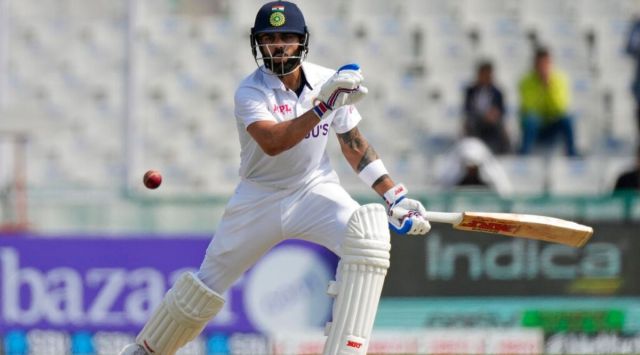Stay updated with the latest sports news across Cricket, Football, Chess, and more. Catch all the action with real-time live cricket score updates and in-depth coverage of ongoing matches.
For the first time in 49 Tests, Kohli’s Test average drops below 50
Kohli's Test average has now slipped below 50 for the first time since August 2017.
 India's Virat Kohli bats during the first test match between India and Sri Lanka in Mohali, India, Friday, March 4, 2022. (AP Photo/Altaf Qadri)
India's Virat Kohli bats during the first test match between India and Sri Lanka in Mohali, India, Friday, March 4, 2022. (AP Photo/Altaf Qadri)It was in his 52nd Test match that Virat Kohli’s average first touched the lofty 50s. Since then, it had never plunged below the gold standard of elite Test-match batsmanship. But he needed to get 43 runs in the Bangalore innings to ensure his average, which was earlier 50.35, did not drop below 50 for the first time in 49 Tests.
It’s now been 18 Tests without a century for Kohli, who followed his 23 in the first innings with a 13 in the second of the Bengaluru match, the second of the two-match Test series. After his dismissal on Sunday, Kohli’s average stands at 49.95.
At his peak, he touched 55.1 and looked set for an upward curve, before it came crashing down. Since his summit, which he achieved when racking up his highest Test score of 254 not out against South Africa, he has averaged only a fraction above 30. A casualty of the dip has been, naturally, his average.
Though Kohli himself has made less fuss about numbers and put more emphasis on the impact of those knocks, a sub-50 average would dilute his credentials to be among the finest batsmen of all-time. The greats, despite their occasional lean patches, have always maintained a career average of 50. Sunil Gavaskar’s has never dropped from the 50s since his Test debut. Once their average crossed 50, Sachin Tendulkar (despite an arid last phase) and Rahul Dravid never let it plummet below this benchmark.
Kohli would care less about numbers, or his eventual place in the history of India’s batting greats. He is already a legend, won more matches than most, led India to record number of wins, but whether he is one of the greatest of all time or one of the greats of his time would depend on that average. It could well determine whether he ends up in the bracket of Alastair Cook and David Warner (mighty good batsmen but not in the G.O.A.T list) or that of Dravid and Tendulkar. He’s certainly in the latter class, in terms of his quality and mastery of conditions, but a sub-50 average would disfigure his aura.
































